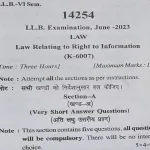Preparing for the 3-year LLB program requires a solid understanding of the core legal subjects and practice through previous question papers. This guide provides important questions and answers for subjects like Constitutional Law, Criminal Law, Contract Law, and more. It helps students understand key topics and exam patterns for better preparation.
Constitutional Law
Question: What is the significance of Article 14 of the Indian Constitution?
Answer: Article 14 ensures equality before the law and equal protection of the laws within India, prohibiting discrimination based on religion, race, caste, sex, or place of birth.
Question: What is the basic structure doctrine?
Answer: The basic structure doctrine limits Parliament’s power to amend the Constitution, ensuring that fundamental principles like democracy and rule of law remain unchanged.
Question: What is the difference between a Fundamental Right and a Directive Principle?
Answer: Fundamental Rights are enforceable in court, whereas Directive Principles are guidelines for the government to achieve social and economic welfare.
Question: What is judicial review?
Answer: Judicial review is the power of the judiciary to examine and determine the constitutionality of laws and executive actions.
Question: What are the key features of the Preamble to the Indian Constitution?
Answer: The Preamble declares India as a sovereign, socialist, secular, democratic republic and ensures justice, liberty, equality, and fraternity.
Question: What is the importance of Article 21?
Answer: Article 21 guarantees the right to life and personal liberty, ensuring no person is deprived of these except by a procedure established by law.
Question: What is the role of the President in promulgating ordinances?
Answer: The President can issue ordinances under Article 123 when Parliament is not in session, having the force of law but requiring later approval.
Question: What is meant by the separation of powers?
Answer: The separation of powers divides responsibilities among the legislature, executive, and judiciary to prevent the concentration of power in one branch.
Question: What is federalism in the Indian context?
Answer: Indian federalism combines a strong central government with powers distributed to states, emphasizing unity while respecting diversity.
Question: What is the process for amending the Indian Constitution?
Answer: Amendments are introduced as bills and require a majority vote in Parliament, with some needing state ratification under Article 368.
… (Include 10 more questions and answers on Constitutional Law)
Criminal Law
Question: What is the difference between a bailable and a non-bailable offense?
Answer: Bailable offenses allow the accused to secure bail as a matter of right, while non-bailable offenses require judicial discretion for bail.
Question: What are the essentials of criminal liability?
Answer: Criminal liability requires an act (actus reus) and intent (mens rea), except in strict liability offenses.
Question: What is the difference between culpable homicide and murder under the IPC?
Answer: Culpable homicide involves causing death with or without intent, while murder requires premeditated intent and specific aggravating circumstances.
Question: What is the significance of Section 375 of the IPC?
Answer: Section 375 defines rape and specifies circumstances where consent is invalidated, ensuring protection for women against sexual offenses.
Question: What is the punishment for theft under the IPC?
Answer: Theft, defined under Section 378 of the IPC, is punishable under Section 379 with imprisonment up to three years, a fine, or both.
Question: What is an anticipatory bail?
Answer: Anticipatory bail is a pre-arrest legal provision under Section 438 of the CrPC, allowing individuals to seek bail if they fear arrest.
Question: What is the difference between compoundable and non-compoundable offenses?
Answer: Compoundable offenses can be settled between parties, while non-compoundable offenses require legal proceedings regardless of mutual consent.
Question: What is the principle of double jeopardy?
Answer: Double jeopardy prevents a person from being prosecuted or punished twice for the same offense, as guaranteed by Article 20(2) of the Constitution.
Question: What is the role of a public prosecutor?
Answer: A public prosecutor represents the state in criminal cases, ensuring fair trial proceedings and justice delivery.
Question: What is a summons case?
Answer: A summons case is a criminal case involving offenses punishable with less than two years of imprisonment, requiring a simpler trial procedure.
… (Include 10 more questions and answers on Criminal Law)
Contract Law
Question: What are the essential elements of a valid contract?
Answer: A valid contract requires offer, acceptance, lawful consideration, lawful object, capacity, free consent, and intention to create legal obligations.
Question: What is meant by the term “void contract”?
Answer: A void contract is an agreement that lacks enforceability by law and holds no legal validity.
Question: What is the difference between an offer and an invitation to treat?
Answer: An offer is a definite proposal to create legal obligations, while an invitation to treat invites negotiations without binding intent.
Question: What is the doctrine of frustration in contract law?
Answer: The doctrine of frustration discharges parties from their contractual obligations when unforeseen events make performance impossible.
Question: What is specific performance in contract law?
Answer: Specific performance is a court-ordered remedy compelling a party to fulfill their contractual obligations rather than pay damages.
Question: What is the difference between liquidated damages and penalty?
Answer: Liquidated damages are pre-agreed compensation for breach, while a penalty is an excessive charge to deter breaches.
Question: What is the principle of privity of contract?
Answer: Privity of contract restricts rights and obligations under a contract to its parties, preventing third-party enforcement.
Question: What is the significance of consideration in a contract?
Answer: Consideration is the price paid for a promise, ensuring reciprocity and enforceability in contractual obligations.
Question: What is an unenforceable contract?
Answer: An unenforceable contract is valid but cannot be enforced in court due to technical defects or statutory requirements.
Question: What is a quasi-contract?
Answer: A quasi-contract is an obligation imposed by law to prevent unjust enrichment, even in the absence of a formal agreement.
… (Include 10 more questions and answers on Contract Law)
Practicing past question papers is crucial for LLB students to understand exam patterns and key legal principles. This guide covers important questions for various subjects to help students prepare thoroughly. Use these questions and answers to build confidence and perform effectively in your LLB exams.
Latest Posts
- Step-by-step guide to download and apply for jee mains admit card 202
- Comprehensive 2025 government holidays and recruitment details for job seekers
- JEE Mains Admit Card 2025: Your Step-by-Step Guide to Downloading the Hall Ticket
- Everything You Need to Know About 2025 Government Holidays Recruitment
- Comprehensive Guide to rrb d group recruitment 2025 – Eligibility, Vacancies, and Application
- Detailed guide to nps trust recruitment 2025 vacancies, eligibility and apply process
- Comprehensive guide to hpcl recruitment 2025 notification, vacancies, and application process
- ignou bed admission 2025 complete recruitment guide with eligibility and process
- Comprehensive Guide to Indian Army Agniveer Recruitment 2025 Notification and Jobs
- Everything You Must Know About CBSE Board Exams 2025 Changes & New Rules






